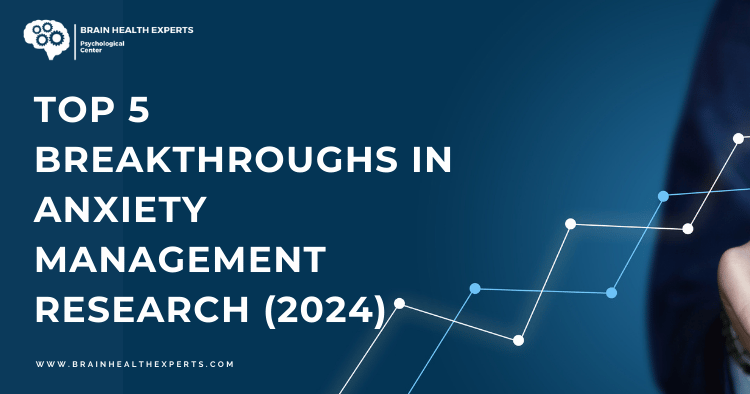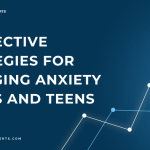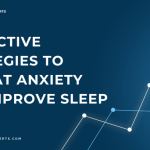Table of Contents
Introduction
Anxiety is a common experience that can significantly affect daily life. With over 40 million adults in the U.S. suffering from anxiety disorders, the need for effective management is more crucial than ever. In 2024, researchers have made groundbreaking advancements in understanding and managing anxiety. Let’s explore the top five breakthroughs that offer hope and new strategies for those dealing with anxiety.
Breakthrough 1: Digital Therapeutics
The rise of technology in mental health care has introduced digital therapeutics as a revolutionary approach to anxiety management. These are software-based interventions that provide evidence-based therapeutic techniques through mobile apps or online platforms.
Key Features:
- Accessibility: Digital therapeutics can be accessed anytime, anywhere, making them an attractive option for those who may feel uncomfortable seeking in-person help.
- Personalization: Many of these platforms use algorithms to tailor content and exercises to individual user needs, enhancing engagement and effectiveness.
Recent studies have shown that digital therapeutics can reduce anxiety symptoms significantly. For instance, a 2023 meta-analysis published in JAMA Psychiatry found that users of these apps reported a 30% decrease in anxiety levels over just eight weeks. For additional resources on managing anxiety, check out 10 Effective Strategies to Manage Anxiety.
Breakthrough 2: Neurofeedback Techniques
Neurofeedback is a non-invasive therapy that trains individuals to alter their brain activity. This technique has gained traction as research reveals its effectiveness in managing anxiety.
How It Works:
- Participants receive real-time feedback on their brain wave activity through EEG sensors.
- By learning to control their brain waves, patients can reduce anxiety levels and improve emotional regulation.
A pivotal study in 2024 published in Neuroscience Letters demonstrated that participants undergoing neurofeedback training showed a 40% decrease in anxiety symptoms compared to a control group. This method empowers individuals with a proactive tool for managing their anxiety. Explore more about emotional intelligence and its relation to anxiety in 7 Ways Emotional Intelligence Boosts Workplace Success.
Breakthrough 3: Mindfulness-Based Interventions
Mindfulness practices, which involve focusing on the present moment and accepting it without judgment, have long been known to benefit mental health. In 2024, research has solidified its place as a vital component in anxiety management.
Research Insights:
- A recent systematic review published in Psychological Bulletin revealed that mindfulness-based interventions reduce anxiety symptoms significantly, with effects lasting for months after the intervention.
- Techniques such as mindful breathing, body scanning, and meditation have been shown to enhance emotional regulation and reduce stress.
Incorporating mindfulness into daily routines can be simple and effective. Just a few minutes of mindfulness practice each day can lead to noticeable improvements in anxiety levels. For practical techniques, refer to 10 Mindfulness Practices to Reduce Stress Effectively.
Breakthrough 4: Gut-Brain Connection
The connection between gut health and mental health has been a hot topic recently. Research in 2024 has unveiled how gut microbiota can influence anxiety levels.
What the Research Says:
- Studies indicate that gut bacteria produce neurotransmitters and other chemicals that directly affect brain function and mood.
- A groundbreaking study published in Nature Microbiology found that individuals with balanced gut microbiota reported fewer symptoms of anxiety.
This discovery highlights the importance of a healthy diet rich in probiotics and prebiotics. Incorporating fermented foods like yogurt, kimchi, and sauerkraut can be an excellent way to support gut health and, consequently, mental well-being. For more insights into the role of nutrition, check out 7 Nutrients to Combat Anxiety Naturally.
Breakthrough 5: Genetic Markers for Anxiety
Genetic research has made significant strides in understanding the biological underpinnings of anxiety. In 2024, scientists have identified specific genetic markers that may predispose individuals to anxiety disorders.
Key Findings:
- A comprehensive study published in The American Journal of Psychiatry identified several genes linked to serotonin regulation and stress response.
- Understanding these genetic factors can lead to personalized treatment options, allowing for more effective anxiety management strategies.
This research paves the way for advancements in pharmacogenetics, where medications can be tailored to an individual’s genetic profile, improving efficacy and reducing side effects. For further exploration of cognitive behavioral therapy techniques, consider reading 10 Effective CBT Techniques to Overcome Anxiety Today.
Conclusion
The landscape of anxiety management is evolving rapidly, thanks to ongoing research and breakthroughs. From digital therapeutics to understanding the gut-brain connection, these advancements provide hope and practical solutions for individuals struggling with anxiety. As we move forward, it’s essential to stay informed about these developments and consider how they can be integrated into personal anxiety management strategies.
Remember, seeking help is a sign of strength, and with these innovative approaches, there’s no reason to face anxiety alone.
If you have any questions or need further information, feel free to reach out or explore the linked resources throughout this article!





